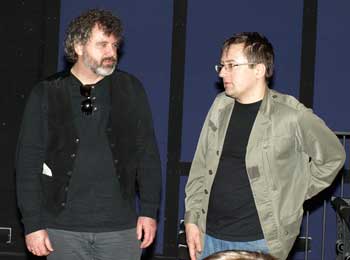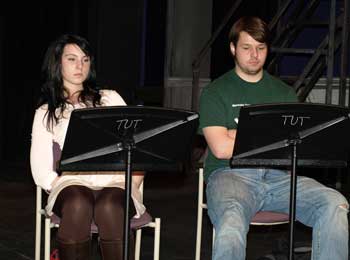A Conversation with
the Translator
Susan Stroup conducts an email interview with John Freedman about the translation of The Schooling of Bento Bonchev. John Freedman, theater critic of The Moscow Times, has published nine books on Russian theater. His play translations have been performed in the United States, Australia and Canada. He is the Russian director of The New Russian Drama Project.
Susan Stroupe is an MFA in Theater candidate at Towson University. She focuses mainly on performance and writing in ensembles or with underserved communities. During Towson's New Russian Drama season, she performed in Vodka, Fucking, and Television (Television), Martial Arts (Woman/Mother), and read stage directions for the readings of The Schooling of Bento Bonchev.
SS: You’ve translated other plays by Maksym Kurochkin. How would you characterize The Schooling of Bento Bonchev as compared to those other works?
JF: This is one of the fabulous things about Max – all of his plays are different from each other. Each is a new step for him. An experiment. An attempt to strike out in a new direction. To conquer new territory. This is an extraordinary thing when you think about it. Vodka, Fucking and Television is an intimate, introspective work. Kitchen is a monstrous, sprawling, multi-genre piece. Repress and Excite plays with the conventions of the traditional boulevard melodrama. Bento is a neat, one might even say “well-made,” play. None of this means that Max is all over the place with his personal style. Every one of his plays is unified by several elements. He is always up to something unexpected beneath the surface of the work. Usually he is subverting and deconstructing whatever genre he is applying in any given play. In Bento, for example, you have this neat, almost mathematically constructed, play, but it is broken down into those crazy flashes that totally recalibrate the seeming symmetry of the events and characters. Another is that he is always throwing quirks and kinks into things. That might be something as simple as his tongue-in-cheek invention of various reproductive methods in Bento or it might be something as mind-bending as Nibelungs morphing into modern Russians without noticing it in Kitchen. Still another is that Max almost always plays games with time. It is like the whole time line of human history is for him nothing but a single temporal entity that is accessible to him (and therefore us) at all times. Bento, of course, takes place somewhere in the not-too-distant future, but doesn’t it look like something that is happening right now?
SS: What attracted you to this play?
JF: Well, I have to admit this: I am attracted to every Maksym Kurochkin play. The mad diversity which I just discussed is one reason for this. Every time Max comes up with a new play you strap on your seat belt and hang on for a ride you know you have never taken before. That’s such an exciting thing. What this means is that each play sinks different hooks in you. Bento knocked me out with its pristine clarity. Max loves to blow smoke in people’s faces. He’s a master at that. But in Bento it was like he hooked up this huge industrial fan and blew all the fog away, leaving behind sparkling clear characters, motivations and events. That doesn’t mean he’s not playing mind games with us, because he is! That is art and Max is a supreme artist. But of all of his plays, Bento is the clearest and most immediately accessible. It reminds me of a long, tall glass of ice cold water. You may find the water is spiked with something after you drink it, but that image of clarity and transparency describes the play for me.
SS: What was the biggest challenge in translating Bento?
JF: I wonder if I should not admit this? There was no challenge. None. This was the easiest, fastest, most obvious, trouble-free translation I have ever encountered. In fact, I feel safe in saying that I will never again have such an easy job of it in my life. This was that one moment for me. The pinnacle of ease. I did the whole thing in two days, and when I finished I had “amassed” a grand-sum total of something like three questions for the author. One had to do with a date or number I couldn’t find on the net. Two had to do with words I didn’t know. And that was it. I was embarrassed to tell the author I hardly needed his help. I’m embarrassed to admit this to you now. It’s supposed to be hard and arduous and grueling, and it’s supposed to require superhuman intelligence, wisdom, knowledge, talent and endurance. Translating is supposed to be this heroic deed of accomplishing the impossible word-after-word, sentence-after-sentence, day-after-day. With Bento none of that happened. I just did it and got back to other business. But don’t tell anybody please.
SS: Bento was written shortly after Kurochkin spent some time in the U.S. at a writer’s workshop at the University of Iowa. Do you see any reflection of his impressions of the U.S. or any ways in which the play might particularly relate to U.S. audiences?
JF: Absolutely. I have no doubt but that Max’s couple of months spent on an American college campus not only influenced the play, they inspired it. They are what caused the play to be written as it is written. In March I was in Ann Arbor at the University of Michigan with Max. We were attending readings and performances of Kitchen and Bento. Max and I were to speak in a Russian literature class and we headed across campus together to find the classroom. At one point we came upon a bike rack that I simply had to stop and photograph. It was exactly as I had imagined the bike rack looking in Bento when I was translating. The play’s marvelous students – Sandy, Cecilia and others – are spitting images of kids you can see walking around any American college or university. Max once told me that he has a tin ear for language and diction. I don’t believe him for a minute. But what he clearly has is an extraordinary ability to sponge up character and personality types. All of the characters in Bento are as American as they can be. I’m quite sure this is the main reason why the play was so easy for me to translate. In a sense, it didn’t need to be translated at all. It just needed to be put into English. Everything else was already there.
SS: The play has now been given two staged readings in the U.S. Towson University presented it in early February, then again in March and May. As you mentioned, there was also a reading in March at the University of Michigan. What insight did you gain from the opportunities to hear the play in front of an audience?
JF: For a translator, hearing a translation performed out loud is no less a shock and opportunity than for an author to see/hear his/her play performed. All of a sudden theory becomes practice. In some cases you are horrified to see that all the wonderful, nuanced choices you made were actually misguided and clumsy. In others you feel a certain discomfort at moments, as if you were trying to line up a stencil on a print but you haven’t quite got it there yet. You’re close, but something needs readjusting. On much rarer occasion you don’t hear yourself as translator at all. That’s the ideal, of course. I had that experience with my translation of Yury Klavdiev’s I Am the Machine Gunner. I was stunned to watch that production by David M. White. I never heard myself at all in that. I only heard Klavdiev. I almost, but not quite, had that experience when I attended readings of Bento in Ann Arbor and Towson. On rare occasion a word would strike me as being just a hair off, an intonation not quite caught. But for the most part I heard Max there, not myself. And that was true in both Ann Arbor and Towson, although the two readings were vastly different. I felt as though the translation held up quite well.
SS: Will your translation choices change as a result of what experienced in these readings?
JF: Yes, literally a few words will change. It was close enough to being a performable translation that I probably won’t make more than a few minor changes. That’s if you’re talking about Bento. But if we talk about some of my other translations that were included in the Towson season – there’s plenty of work to be done yet. It was an amazing opportunity for me to see the work that everyone – actors, stage hands, directors, designers, lighting designers, sound designers, photographers, graphic artists, dramaturgs – put into all of these readings, workshops and productions. I have the distinct feeling that I learned more from it all than anyone. I am really grateful for that.

From left, John Freedman and Maksym Kurochkin in discussion following a reading of The Schooling of Bento Bonchev at Towson University. March 2010. Photo: Robyn Quick.

From left, Shannon McPhee and Matt Shea at a public reading of The Schooling of Bento Bonchev. Towson University. February 2010. Photo: Robyn Quick



